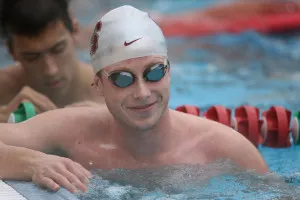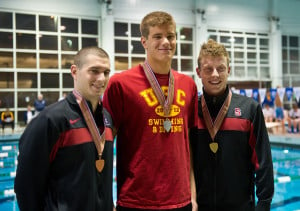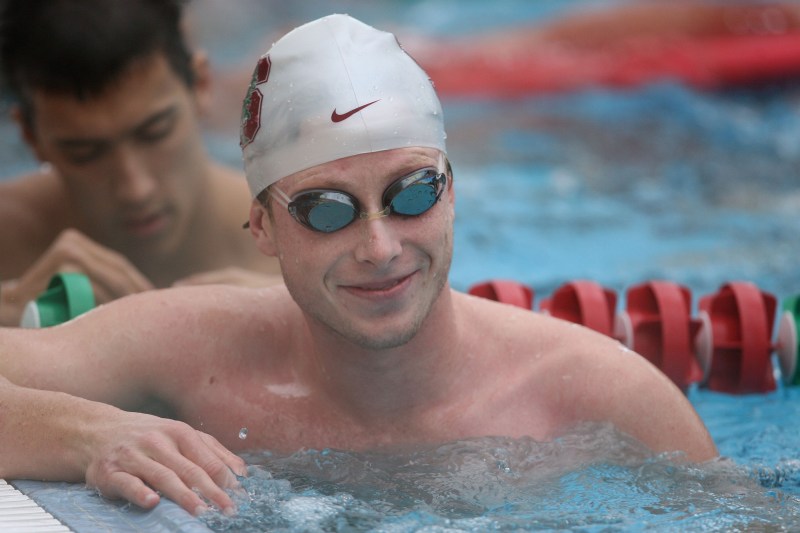Chad La Tourette is five laps away from making the Olympics.
It’s the 1,500-meter freestyle finals on the last day of the 2012 U.S. Olympic Trials in Omaha, Neb., where the nation’s top 2,000 swimmers have gathered to compete for just a handful of spots on the U.S. Olympic team.
A recent Stanford graduate, La Tourette has logged lap after lap — sometimes at the rate of 16,000 meters per day — to prepare for the most important race of his life. Stanford is a factory where Olympians are mass-produced every four years: Cardinal-affiliated athletes have collected a total of 224 medals in Olympic history, and if Stanford were its own country, it would be ranked 24th in the all-time Olympic medal standings, ahead of Spain, Greece and Mexico.
Failure is rarely associated with Stanford athletics.

Four years earlier at the 2008 Trials, La Tourette finished third in the same event in the same pool. At almost every other meet, a swimmer is given a bronze medal if he finishes third, but because only the top two finishers in each event qualify for the Olympics, coming in third at the Trials is a swimmer’s worst nightmare.
It was a setback for La Tourette at first, but since then he has won six medals at major international competitions, broken an American record and claimed an NCAA title and two runner-up finishes. He came into the Trials as the owner of the nation’s fastest time in the 30-lap race.
His journey to the 2012 Trials should serve as a tale of redemption, a tale of a veteran swimmer finally fulfilling his ultimate dream after coming tantalizingly short four years ago. Stanford is a breeding ground for Olympic success, and there is no reason to think that La Tourette won’t join the hundreds of Stanford Olympians who have come before him.
But he won’t. La Tourette has led the field for the first 12 minutes of the race, but in the next three, his dream turns into a nightmare — the very same one he lived in 2008.
La Tourette climbs out of the pool, a third-place finisher once again. The first person he finds is Bill Rose, his coach.
“It was the worst thing that’s ever happened to me in my 45 years of coaching,” Rose will later remember. La Tourette will have trouble forgetting, too.
For now, all he does is stare at his coach.
***
Unlike most record-setting athletes, La Tourette wasn’t born with great physical talent.
He first started swimming as an 8-year-old when he joined the Mission Viejo Nadadores, one of the largest and most acclaimed swimming clubs in the country. But La Tourette didn’t post eye-popping times early on as an age-group swimmer. Nor was there any other indication that he would become one of the best swimmers to ever come out of Mission Viejo, the only club team that he trained with until 2012.
It wasn’t until La Tourette was 13 years old that he caught the attention of Rose, the longtime head coach of Mission Viejo and a member of the American Swim Coaches Hall of Fame. Rose was impressed by La Tourette’s attitude and approach to his races at a local summer meet, and six months later, La Tourette began training with the group of swimmers directly coached by Rose, an honor reserved for the top swimmers at Mission Viejo.
“Chad was a late bloomer,” Rose said. “Through his age group, he was just kind of a normal swimmer, and he matured physically very late.”
But when La Tourette did finally bloom, his ceiling only kept on rising. Two years after Rose took him under his wing, he qualified for his first national meet — the 2005 World Championship Trials — in Indianapolis. Rose expected the meet to serve as a good learning experience for La Tourette, but the 16-year-old swimmer surpassed his coach’s expectations by qualifying for the final heat of the 1,500 and breaking his personal record in the event by nearly 40 seconds.
“That was the start of everything,” Rose said.
Despite La Tourette’s rapid time drops, he and his family didn’t treat swimming as life or death. Rose remembers having a conversation with Chad’s father, Ken La Tourette, after the Indianapolis meet that signaled to Rose that the family was a bit naïve about La Tourette’s potential. It was a typical parent-to-coach conversation that often drives swim coaches crazy, Rose laughed.
“We’re going on vacation in the summer, and Chad will be gone for three weeks, if that’s okay,” Rose remembers Chad’s father saying.
“No, that’s not okay — not if he’s going to be fighting for an international [meet] spot,” Rose told him.
“Well, we’re going to be in London and they have hotel pools there, so I’m sure he can swim back and forth,” Ken said.
In the end, the La Tourette family took its annual summer trip, and La Tourette still posted decent times at the summer national meet despite having been on vacation just a few weeks earlier.
LaTourette would eventually grow to be 5-foot-11, short when compared to the towering heights of some of the top distance swimmers in recent history — many, such as 1,500-meter world record holder Sun Yang, are 6-foot-4 to 6-foot-6. But La Tourette didn’t let his physical limitations impede his progress towards becoming one of the best distance swimmers in the country.
“What he didn’t have in size and innate athleticism, he made up in heart,” Rose said. “Chad never backed down in a race. Chad never backed out of anything. He was very strong mentally, and he was also one of the top three or four most hardworking swimmers I’ve ever coached.”
“I wasn’t born with a Michael Phelps build,” La Tourette said of the 22-time Olympic medalist. “But I was tough. When you have the physical toughness as well as the mental game to back it up, you can take yourself really far in this sport, especially in distance swimming.”
***
La Tourette entered the 2008 Olympic Trials as the fourth seed. The 19-year-old finished second in the preliminary session and was by far the youngest swimmer among the competitors in the finals race who had a realistic chance of qualifying for the Olympics. Big meets weren’t new for La Tourette despite his young age. Not only did he come into the Trials with multiple national championship meets under his belt, but he also had a fair share of experience in international competitions, including winning two individual gold medals at the 2007 World University Games and placing fourth in the 5K open-water race at the 2008 Open Water World Championships.

But as both La Tourette and Rose acknowledged, the intense and high-pressure atmosphere of the Trials is unlike that of any other competition in swimming.
“I definitely brought a deer-in-the-headlights element to the 2008 Trials,” La Tourette said. “In some regards, I was pretty fazed by the difference that the Trials brings in terms of the level of energy and also just how much different it is from other swim meets, including top-level international swim meets.”
The high level of anxiety that athletes feel at the Olympic Trials extends beyond swimming. Stanford diving head coach Rick Schavone, a four-time NCAA Coach of the Year who has coached diving for over 40 years, believes that the Olympic Trials for divers is harder than the actual Olympic Games.
“Because we have so much depth in this country and so much pressure to make the team, the Trials is the toughest meet my athletes go through,” Schavone said.
“The Olympic Trials is a mental game,” Rose added. “And that’s why so many swimmers get beat.”
However, La Tourette fared well mentally. Rose game-planned La Tourette’s 1,500-meter race with the goal of beating Erik Vendt, who was the top seed in the finals and also had the fastest time in the 1,500 in the world so far that year. The coach felt that La Tourette would most likely finish in the top two and qualify for the Olympics if he could beat who they thought was by far the most impressive swimmer in the 1,500 coming into the Trials. La Tourette swam the race exactly as Rose drew it up. Not only did La Tourette beat Vendt, but he also set a personal record by breaking the 15-minute barrier.
The only problem was that two other swimmers — Peter Vanderkaay and Larsen Jensen — beat Vendt by even more and finished ahead of La Tourette by a comfortable margin.
“Chad swam a great race,” Rose said. “He did what he was asked to do, but it was just in the cards that he didn’t make it. Bottom line is, odd man out at third. That was a very, very mentally taxing thing for both of us — probably more for me than him.”
The result was indeed disappointing for La Tourette, but he bounced back quickly for an athlete who had just missed the Olympics by one spot. With four years at Stanford to look forward to, it took him only one week to reset mentally.
“I didn’t really give myself time to be discouraged by the result because I was about to embark on a new chapter in college,” La Tourette said. “And that was a very good prospect to have in terms of not letting myself be too down about it and being able to look forward to a new beginning at Stanford.”
***
In his time on the Farm, La Tourette became the best distance swimmer in Stanford history. He won the NCAA title in the 1,650-yard freestyle as a sophomore, and though he finished second at the NCAAs in his junior and senior seasons, he continued to drop time until he broke the American record in the 1,650 at his last NCAAs in 2012. La Tourette ended his decorated college career as an eight-time All-American and five-time conference champion.
After every college season, La Tourette returned to Mission Viejo for the summer to train with Rose, his longtime club coach. The transition always proved to be seamless. He grabbed one gold and two silvers at the World University Games in the 2009 summer season, won his first national title in the 1,500-meter in the summer of 2010 and recorded a top-five finish in the 1,500 at the World Championships in the summer of 2011. Given all the success that La Tourette had training under Rose since he was 13, it was a forgone conclusion that he would go back to Mission Viejo to train in the four months between the NCAAs and the Olympic Trials.
“I knew there would be a more committed atmosphere at Mission Viejo,” La Tourette said. “It was also nice to be able to live at home while training, and have that as a support channel.”
But for the first time, things didn’t go smoothly for La Tourette back at home.
Looking back, La Tourette felt that he overtrained and added too many wrinkles into his training regimen. Right after a big meet such as the NCAAs, a coach will generally increase the intensity and yardage of a swimmer’s workouts to prepare him for the next important meet. But there is also a delicate balance between getting out of shape and training too hard, and La Tourette believes that a 23-year-old male swimmer such as himself doesn’t lose his training base that easily.
“The science says it takes actually quite a long time for the aerobic base to go away, like on the order of 10 weeks or so.” La Tourette said. “I think any perception of a loss of base is more psychological than physical … And when you overtrain, it’s very easy to forget details. So when you’re tired mentally and physically, you’re letting your form degrade in practice or not worrying about turns and starts as much.”
“I made it tougher than it should have been,” he added. “Four months actually isn’t that long an amount of time physiologically to introduce new training aspects.”
Like many elite swimmers, La Tourette also went to Colorado Springs, Colo., for altitude training camp. Altitude training can help increase a swimmer’s performance by enlarging his or her blood cells, but the benefits are temporary. La Tourette believes that he mistimed the training trip by going too early, and as a result, he was not able to reap the full benefits of altitude camp.
“I don’t know, I really don’t know,” said Rose, when asked if he thought La Tourette’s altitude training was mistimed. “Ever since 2012, I’ve been asking myself questions and coming up with different answers all along. I can’t tell you if that was good, bad or in between.”
La Tourette also feels that the length of his taper was too short. All of his successful tapers have been around three weeks, said La Tourette, but he didn’t start decreasing his training load until a week and a half before the Trials. He blamed his coach for not sticking to the same workout routine that led to success in the three earlier summers.
“Everyone was wondering why we started taper so late,” La Tourette said. “I found myself going into the coach’s office being like, ‘Why was today’s workout so long? What was today’s workout so hard?’”
Rose said he doesn’t remember having that conversation.
